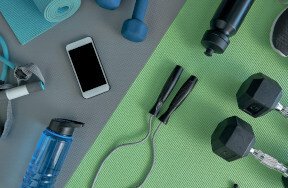The week of February 22nd - February 28th, 2021 marks National Eating Disorders Awareness Week, so Kidzworld has put together a list of facts you should remember the next time you start freaking out about your body.
Types & Symptoms of Eating Disorders
Eating disorders -- such as anorexia, bulimia, and binge eating disorder – include extreme emotions, attitudes, and behaviors surrounding weight and food issues. Eating disorders are serious emotional and physical problems that can have life-threatening consequences for females and males.
 Eating Disorders Awareness Week
Eating Disorders Awareness Week
Anorexia Nervosa
- Inadequate food intake leading to a weight that is clearly too low.
- Intense fear of weight gain, obsession with weight and persistent behavior to prevent weight gain.
- Self-esteem overly related to body image.
- Inability to appreciate the severity of the situation.
- Binge-Eating/Purging Type involves binge eating and/or purging behaviors during the last three months.
- Restricting Type does not involve binge eating or purging.
- Learn more.

Binge Eating Disorder
- Frequent episodes of consuming very large amount of food but without behaviors to prevent weight gain, such as self-induced vomiting.
- A feeling of being out of control during the binge eating episodes.
- Feelings of strong shame or guilt regarding the binge eating.
- Indications that the binge eating is out of control, such as eating when not hungry, eating to the point of discomfort, or eating alone because of shame about the behavior.
- Learn more.

Bulimia Nervosa
- Frequent episodes of consuming very large amount of food followed by behaviors to prevent weight gain, such as self-induced vomiting.
- A feeling of being out of control during the binge-eating episodes.
- Self-esteem overly related to body image.
- Learn more.

Stop Trying to Look Like Celebrities
- There are three billion women who don't look like supermodels and only eight who do.
- The models in magazines are airbrushed - no one, not even models, look that good without some help!
- Marilyn Monroe wore a size 14 and is still considered one of the most beautiful women in history.
- If Barbie was a real woman, she'd she would be six feet tall and weigh 100 lbs!
- If female mannequins were real women, they'd be too thin to have babies.
- The average American woman is 5'4" tall and weighs 140 pounds. The average American model is 5'11" tall and weighs 117 pounds. Most fashion models are thinner than 98% of American women.
- A psychological study in 1995 found that three minutes spent looking at a fashion magazine caused 70% of women to feel depressed, guilty and shameful of their bodies.
Some Scary Stats
- 42% of first to third grade girls want to be thinner.
- 81% of 10 year olds are afraid of being fat.
- 51% of nine and 10 year-old girls feel better about themselves if they are on a diet.
- Without treatment, up to 20% of people with serious eating disorders die. With treatment, that number falls to 2-3%.
- About 50% of people who have been anorexic develop bulimia or bulimic patterns.

What is NEDAwareness Week?
NEDAwareness Week is a collective effort of primary volunteers, including eating disorder professionals, health care providers, students, educators, social workers, and individuals committed to raising awareness of the dangers surrounding eating disorders and the need for early intervention and treatment.
How NEDAwareness Week Works
NEDA asks everyone to do just one thing to help raise awareness and provide accurate information about eating disorders. NEDAwareness Week participants can choose from a huge range of ways to get involved: Distribute info pamphlets and put up posters, write one letter for Media Watchdogs, register as a Volunteer Speaker or host a Volunteer Speaker, post information on Facebook or arrange interactive and educational activities such as a meditation and yoga event, panel discussions, fashion shows, movie screenings, art exhibits and more. As an official NEDAwareness Week participant you can be involved in any way that works with your schedule, resources, community, and interests.These events and activities are vital to attracting public media attention - on local, national and international levels.
It's Time to Talk About It
Resources:
- Check out The National Eating Disorder Website for more information on eating disorders.
- KidsHealth - A safe, private place for kids & teens who need honest, accurate information and advice about health, emotions, and life.
- Teen Line - A helpline for kids and teens to work through their personal issues and mental health as needed. 1-800-TLC-TEEN or 1-800-852-8336 (Toll Free US & Canada).
Related Stories:
- Dying to Be Thin
- A Body Image Reality Check
- Quiz! Test Your Eating Disorders Trivia
- More Health and Body Tips!

































